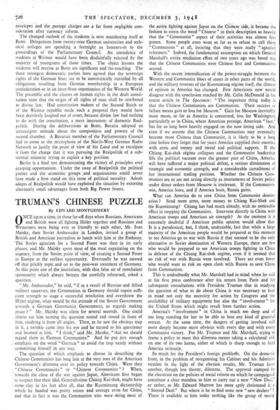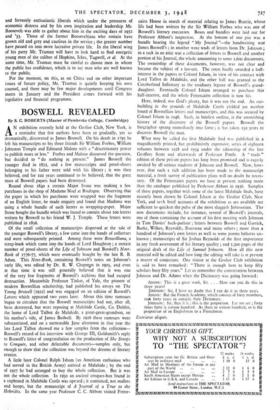TRUMAN'S CHINESE PUZZLE
By EDWARD MONTGOMERY
ONCE upon a time, in those far-off days when Russians, Americans and British were all fighting Hitler together and Russians and Westerners were being ever so friendly to each other, Mr. Ivan Maisky, then Soviet Ambassador in Undon, invited a group of British and American journalists to lunch with him at the Embassy. The Soviet agitation for a Second Front was then in its early phases, and Mr. Maisky spent most of the meal expatiating on the urgency, from the Soviet point of view, of creating a Second Front in Europe at the earliest opportunity. Eventually he was steered off that prickly topic and on to the post-war treatment of Germany. At this point one of the journalists, with that false air of nonchalant spontaneity which always betrays the carefully rehearsed, asked a question.
"Mr. Ambassador," he said, "if as a result of Russian and Allied military successes, the Communists in Germany should regain suffi- cient strength to stage a successful revolution and overthrow the Hitler regime, what,would be the attitude of the Soviet Government towards a German Communist Government, as regards making peace ? " Mr. Maisky was silent for several seconds. . One could almost see him turning the question round and round in front of him, studying it from all angles. Then, as he saw the obvious trap in it, a twinkle came into his eye and he turned to his questioner and beamed at him. "I think," said Mr. Maisky, "that we should . regard them as German Communists." And he put just enough emphasis on the word " German " to avoid the trap neatly without committing himself in any way.
The question of which emphasis to choose in describing the
Chinese Communists has long lain at the very root of the American Government's dilemma over its policy towards China. Were they "Chinese Communists" or "Chinese Communists"? When, towards the close of the war against Japan, Americans first began to suspect that their idol, Generalissimo Chiang Kai-shek, might have some clay in his feet after all that the Kuomintang dictatorship which he headed was pretty rotten and corrupt even for China, and that in fact it Was the Communists who were doing most of
the active fighting against Japan' on. the Chinese side, it became the fashion to stress the word " Chinese " in their description so heavily
that the " Communist " aspect of their, activities was almost for
gotten. Some people ,even went so far as to refuse to call them " Communists " at all, insisting that they were really " agrarian reformers." Indeed, the fundamental assumption on which General Marshall's entire mediation effort of two years ago was based was that the Chinese Communists were Chinese first and Communists second.
With the recent intensification of the power-struggle between the Western and Communist blocs of states in other-parts of the world, and the military reverses of the Kuomintang regime itself, the climate of opinion in America has changed. Few Americans now would disagree with the conclusion reached by Mr. Colin McDonald in his
recent article in the Spectator: "The important thing today is
that the Chinese Communists are Communists. Their success or failure means gain or loss for Moscow." Gain for Moscow inevitably must mean, so far as America is .concerned, loss for Washington, particularly so in China, where American prestige, American "face," has for so long been heavily engaged on the now losing side. And even if we assume that the Chinese Communists may eventually become more Chinese than Communist, it is likely to be a long time before they forget that for years America supplied their enemies with arms and money and moral and political support. If the Chiang Kai-shek regime collapses and the Communist leadership fills the political vacuum over the greater part of China, America will have suffered a major political defeat, a serious diminution of strategic and economic strength, and a considerable curtailment of her international trading position. Whether the Chinese Com- munists are or are not acting directly as instruments of Soviet policy under direct orders from Moscow is irrelevant. If the Communists win, America loses, and if America loses, Russia gains.
What can America do to save China from Communist domin- ation? Send more arms, more money to Chiang Kai-Shek and the Kuomintang? Chiang has had much already, with no noticeable effect in stopping the Communists. Intervene directly in China with American troops and American air strength? At the moment it is extremely doubtful if American public opinion would allow that.
It is a paradoxical, but, I think, undeniable, fact that while a large majority of the American people would be prepared at this moment to see America go to war with Russia if that seemed toji)e the only alternative to Soviet domination of Western Europe, there are few who would be prepared to see American troops fighting in China in defence of the Chiang Kai-shek regime, even if it seemed that no risk of war with Russia were involved. There are even fewer who would want to risk an open clash with Russia to save China from Communism.
This is undoubtedly what Mr. Marshall had in mind when he said at his first press conference after his return from Paris and his subsequent consultations with President Truman that in studying the question of what to cid about China it was necessary to beat in mind not only the necessity for action by Congress and the availability of military equipment but also the "involvement" for the United States which might result from further action.
America's "involvement" in China is much too deep and of too long standing for her to be able to beat any kind of graceful retreat. At the same time, the dangers of getting involved still more deeply become more obvious with every day and with every Communist victory, For Mr. Truman and Mr. Marshall, trying to frame a policy to meet this dilemma means taking a calculated risk on one of its two horns; either of which is sharp enough to hurt America seriously.
So much for the President's foreign problenis. On the domestic front, in the problem of reorganising his Cabinet and his Adminis- stration in the light of the election results, Mr. Truman faces another, though less thorny, dilemma. The approval stamped by
the electorate on the policies of social reform on which he campaigned constitute a clear mandate to him to carry out a new "New Deal," or rather, as Mr. Edward Murrow has more aptly christened it, a "Second Deal." But where is he to find some new "new dealers " ? There is. available to him today nothing like the group of young and fervently enthusiastic liberals which under the pressures of economic distress and by his own inspiration and leadership Mr. Roosevelt. was able to gather about him in the exciting days of 1932 and '33. Those of the former Rooseveltians who remain have grown old and grey and cautious in the service ; the greater number have passed on into more lucrative private life. In the liberal wing of his party Mr. Truman will have to look hard to find energetic young men of the calibre of Hopkins, Ickes, Tugwell, et al. At the same time, Mr. Truman must be careful to choose men in whom the public has confidence, which is to say men who are well known to the public.
For the moment, on this, as on China and on other important issues of future policy, Mr. Truman is quietly keeping his own counsel, and there may be few major developments until Congress meets in January and the President comes forward with his legislative and financial programme.



































 Previous page
Previous page